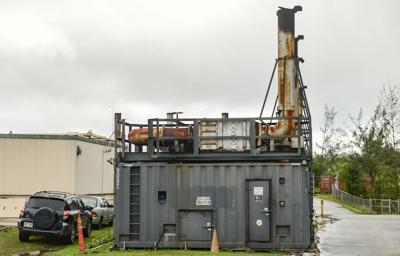The Public Utilities Commission on Thursday night gave the green light for the Guam Power Authority’s contract for 20 megawatts of temporary, emergency power to help stave off load shedding this summer.
Unanimous approval of the $25 million contract came just hours after it cleared the attorney general’s legal review.
GPA General Manager John Benavente said the order for work to start will go out on Monday, April 1.
A space for the generators, which GPA plans to run for about two years, has already been cleared up in Yigo.
“There’s no doubt that if we don’t have the 20 megawatts, there will be major load shedding,” Benavente told the PUC.
But the generators will come online late.
GPA wanted the 20MW generators from supplier Aggreko online by May, when temperatures and power demand start to take off for the island.
But a change in the law was required before the utility could proceed with the expedited deal on an emergency basis, slowing progress.
Benavente said it’s too late to meet the May goal, and the 100-day timeline to bring the generators online will take them out to July 11.
He said GPA would try to expedite the project, though it would still take them out to at least June.
May is about when peak power demand starts to surpass 250 MW, GPA data has shown. In order to prevent the load shedding seen last year, the power authority has to keep more power capacity than that online.
Though GPA has hovered around 270MW of capacity in recent months, that number dips whenever one of its aging generators goes offline for maintenance and repairs.
On Thursday night, with the baseload Cabras 2 power plant taken down, the island had just 238MW of capacity, Benavente said.
Peak demand that day was 233MW, Benavente said.
Load shedding peaked last November, when residents in different areas of the island were left in the dark for a total of 301 hours, the PDN reported previously.
Benavente on Thursday night said things have been fairly stable since last Thanksgiving, with blackouts minimal.
The Cabras 2 plant, which had been plagued with boiler tube leak after boil tube leak from September through November of last year, has been in better order through 2024.
‘Knock on wood and pray’
“Me, I like to knock on wood and pray,” Benavente told commissioners.
He told PUC that the power authority will make every effort to prevent load shedding until the temporary power comes online.
The 20MW Yigo Combustion Turbine, damaged by Typhoon Mawar last year, will come online in April to help bridge the gap, he said.
GPA also has various ongoing repairs to try and add extra capacity to the grid.
PUC Administrative Law Judge Fred Horecky recommended commissioners approve the contract, after his own review.
The deal for temporary power was not cheap, Horecky said.
“You’re having a company bring in all the equipment, operate it. There’s an initial start up charge of $1 million to get everything in order,” he said.
But the alternative was to take a chance on frequent load shedding returning, Horecky said, and there was no doubt GPA needed the extra capacity.
He noted reserve power would be needed until the activation of the new 198 MW Ukudu power plant, which GPA is trying to get done by next September.
The contract with Aggreko, procured on an emergency basis, was “fairly standard.”
Benavente said there are fixed capacity charges and maintenance costs that will have to be paid to Aggreko even if GPA does not run the temporary generators. But because they are more fuel efficient than what GPA already owns, the utility plans to run the temporary units continuously.
The utility will actually save money on fuel using the temporary generators, about $3.8 million in the first year, and $4.3 million in the second.
Besides providing temporary generators, the contract also will have Aggreko helping GPA bring online an extra 34MW of power by repairing older, existing generators. That will take longer, between six and nine months.
Parkinson worried it could be too late
Power oversight chairman Sen. Will Parkinson said he was glad to see the contract move forward, but was worried that it may be too late to stave off load shedding this summer.
Parkinson led the effort in the Legislature to get GPA’s power contract exempted from certain procurement regulations, like the stay on procurement that would usually happen if a competing company challenged the award to Aggreko.
“Now that it’s through, let’s get it all the way through and see what the actual timeline is going to be. I’m hoping that we can get it done in time that load shedding might not be an issue, but I’m not sure,” he said.
The senator said he did plan to get updates from GPA management in coming weeks, to see progress made on other projects meant to add power generation to the grid.
Load shedding was now on GPA, the PUC and the attorney general, though he would provide any help on the legislative end, if needed.











(1) comment
Can you believe Senators sat on it in December? Sens. Taitague, Perez and the Speaker. The local axis of 'evildoers.'
Welcome to the discussion.
Log In
Keep it Clean. Please avoid obscene, vulgar, lewd, racist or sexually-oriented language.
PLEASE TURN OFF YOUR CAPS LOCK.
Don't Threaten. Threats of harming another person will not be tolerated.
Be Truthful. Don't knowingly lie about anyone or anything.
Be Nice. No racism, sexism or any sort of -ism that is degrading to another person.
Be Proactive. Use the 'Report' link on each comment to let us know of abusive posts.
Share with Us. We'd love to hear eyewitness accounts, the history behind an article.